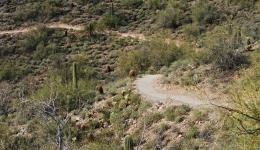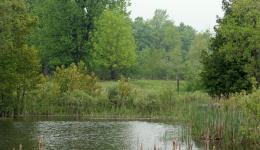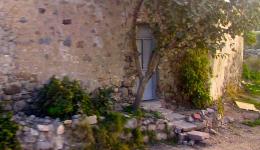Category:
A few years ago, Jane and I went with another couple to share a short voyage on the tall ship, Kajama, which is docked and sails out and about Toronto Harbour. The wind in the sails and on your face, the spectacular views of the Toronto skyline and further west along the shore and out into the open lake, exhilarating.
Standing on the pier before boarding, one is amazed at the trim and sail of this tight craft. Its masts stand tall like trees in autumn when the leaves have gone, but soon the white and colour of the sails will announce a new Spring as the wee trip gets underway. But standing there, first, one is amazed - at the beauty, the history, the potential in this ship. When once aboard and looking towards the shore, one is overwhelmed with the immensity and enormity of the skyline, and all of the office towers, the condos, the hotels and and other more plain and utilitarian buildings. Overwhelmed, because they portray places of employment, and the homes and environment of thousands of people.
Mark 3:7-19 records how Jesus went about doing good. And as he did so, healing folk of all the things that ailed them and kept them from being truly themselves, performing wonderful miracles, one after another - so much that the crowds swelled and grew, and became so great and pressing that Jesus chose to get into a little boat and move out a way from the shore. I guess the disciples stayed on the beach, though one or two of them may have been on board this craft, perhaps the fishing vessel of one or two of them. Looking at what Jesus had done; well, they must have been amazed, those disciples with the others. Looking at Jesus, they may have been astounded too at the wonders they were discovering in Him, in His life, His ministry, in His compassion and love so readily demonstrated to so many.
After speaking about his favourite topic: ‘the Kingdom of God, Jesus came ashore, made his way through the crowd, escaped to to speak, and went up into a hilly, more mountainous region. And he brought a few of his larger group of disciples with him, those who were apprentice-learners of this new Rabbi, following Him everywhere, getting as close as possible, learning in the way and by the way the ways of God as Jesus lived them out. But he took twelve in particular, says Mark, and called them to himself. He wanted them to be with Him and He wanted to sent them forth to do the kinds of things He was doing.
If there was a sermon here it would have three points, beyond the above introduction. For Jesus wanting the Twelve to be with him, I think speaks of Community. He wanted to build a community; to start a Church (ekklesia = 'called out ones'). A movement is not something you do by yourself any more than becoming a person is something you can by yourself: you have to be in community. The idea of being WITH Jesus is a powerful one. They are with each other, coming together from disparate and for some, perhaps, desperate backgrounds: all different - each with his own personality, problems, goals and aspirations. Some learning in one way; some in another. Some peaceable and others loud and noisy; some quietist contemplators and others zealots and revolutionaries. A mixed band really, not one like the other - but united in Jesus. Jesus called them that they might be WITH - with each other and with Him.
The second point, if this was a sermon, would be to notice and emphasize this WITH-NESS with Jesus. That they might be with HIM. What an astounding privilege, though they did not yet fully know who He was nor what He was about. That He was God, come in the flesh: Immanuel (God with us) as promised by the Old Testament prophets had not likely been fully fathomed or even basically realized perhaps at this juncture in Jesus’ ministry. But there was something about Him that drew them. When he’d called them initially to follow Him - to come and see; to come and live with Him, they’d been curious but convinced enough to drop everything and start to follow Him. And now they were being singled out in a new way, to be even closer to Him, to share life with Him in ways in which they could not even as yet imagine, with a cost for each to follow that had they known - well, who knows, would they have turned back, turned away? But they thought He was perhaps Messiah, perhaps the One God had sent to deliver His People. How He would do that, they scarcely knew; that He might do that, they hoped, were intrigued, were compelled enough to follow, and to come closer still - further up and farther in.
And then the third point would be that Jesus had called them so that He might send them out. The word apostle comes from the Greek which simply means ‘sent ones.’ They were to be enMission. They were to be ambassadors. They were going to do the very things they were seeing Jesus doing and, said Jesus on at least one occasion, you’ll be doing even more than I.Incredible, unfathomable. Not just amazing this view, this realization; but also over-whelming. How on earth can disciples hope to do, begin to do, actually accomplish the work that God came in Christ to do? I mean, He was God - and we’re not, and neither were those disciples, that initially gathered motley true. But here’s the secret, I think - the key. When Jesus was on earth, though He was God, He lived His live and did His work and ministry, solely in reliance upon God the Holy Spirit, the Third Person of the Trinity (of Father, Son and Spirit). In this Jesus demonstrated for the disciples how to be and to do, in Godly living and work.
We remember that at times He said, 'the work you see me doing is not mine, not me doing it; the Father is doing it though me.' Another time he said, The words I speak, are not mine but those the Father has given me.' And we know that in Gethsemane Garden, on the night of His betrayal and the even of His crucifixion, that after an agonizing period of prayer He concluded with these words: Not my will Father; yours be done. So the work and the words and the will that Jesus did, utter and expressed were (as Dr. Maurice Boyd used to put it): ‘utterly derived.’ They came as from another; they were flowing through Him by the power and guidance and ability that He depended upon, as that of the Holy Spirit
Jesus was fully human (I think the Bible teaches), as well as fully God. And in his humanity, living with and among humans, and specifically as close to these twelve, He was showing how any disciple of Jesus can live. We lie over our heads, so to speak; beyond our natural ability and even our own desire, resolve and cranked-up will and reserves. We can do nothing in the life and realm of God that will impact and influence our world but what is given to us, allowed to us, flows into us and through us, as by the Holy Spirit. In that sense we are step-down transformers of a much mightier Power; we are wee bits of pipe, conduits through which the flow of life-giving water of the Spirit may come, to bless others and as it does, blesses us by-the-by. We remain frail, earthen vessels as St. Paul puts in his Ephesian letter (some more or less cracked-pots than others), so that the power, the excellency might be shown, demonstrated to be that of God and not of ourselves.
We cannot live the life Jesus lived by ourselves; but we can live this life by the very same Spirit who indwelled, energized, inspired and enabled Jesus in all that He said and did. In fact, the Scriptures say that the Spirit that raised Jesus from the dead will also dwell in our mortal bodies!
Amazed? Overwhelmed? Yes, and we should be. We can’t do this in and by ourselves. Humbled? Yes we must be since it is all of grace - that we are called to be with Jesus, to join in this great work in the Father’s plan of reclamation and restoration of our world.









